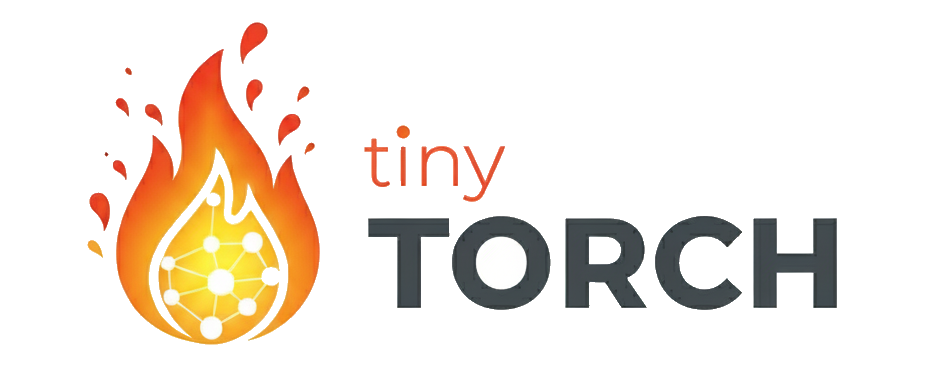TinyTorch for Instructors: Complete ML Systems Course#
📖 For Setup & Daily Workflow: See Technical Instructor Guide for step-by-step NBGrader setup and semester management.
🏫 Turn-Key ML Systems Education
Transform students from framework users to systems engineers
Transform Your ML Teaching: Replace black-box API courses with deep systems understanding. Your students will build neural networks from scratch, understand every operation, and graduate job-ready for ML engineering roles.
🎯 Complete Course Infrastructure#
What You Get: Production-Ready Course Materials
- 20 progressive modules with NBGrader integration
- 200+ automated tests for immediate feedback
- Professional CLI tools for development workflow
- Real datasets (CIFAR-10, text generation)
- Complete instructor guide with setup & grading
- Flexible pacing (8-20 weeks depending on depth)
- Industry practices (Git, testing, documentation)
- Academic foundation from university research
Course Duration: 14-16 weeks (flexible pacing)
Student Outcome: Complete ML framework supporting vision AND language models
Complete Instructor Documentation
See our comprehensive Instructor Guide for:
Complete setup walkthrough (30 minutes)
Weekly assignment workflow with NBGrader
Grading automation and feedback generation
Student support and troubleshooting
End-to-end course management
Quick reference commands
🌟 Why TinyTorch for Your Classroom#
🎯 Deep Learning Outcomes
Students build neural networks from scratch
- Graduates understand deep systems architecture
- Can debug ML issues from first principles
- Prepared for ML engineering roles
- Confident implementing novel architectures
⚡ Zero-Setup Teaching
30-minute instructor setup, then focus on teaching
- NBGrader integration: Automated grading & feedback
- One-command workflows: Generate, release, collect assignments
- Progress dashboards: Track all students at a glance
- Flexible pacing: Adapt to your semester schedule
🏆 Industry-Standard Workflow
Students learn professional ML engineering practices
- Git workflow: Feature branches, commits, merges
- CLI tools: Professional development environment
- Testing culture: Every implementation immediately validated
- Documentation: Clear code, explanations, insights
🔬 Deep Systems Understanding
Beyond APIs: Students understand how ML really works
- Memory analysis: Profile and optimize resource usage
- Performance insights: Understand computational complexity
- Production context: How PyTorch/TensorFlow actually work
- Systems thinking: Architecture, scaling, optimization
Course Module Overview#
The TinyTorch course consists of 20 progressive modules organized into learning stages.
📖 See Complete Course Structure for detailed module descriptions, learning objectives, and prerequisites for each module.
Academic Learning Goals#
What Students Will Achieve:
Build deep systems understanding through implementation
Bridge gap between ML theory and engineering practice
Prepare for real-world ML systems challenges
Enable research into novel architectures and optimizations
Core Capabilities Developed:
Implement neural networks from scratch
Understand autograd and backpropagation deeply
Optimize models for production deployment
Build complete frameworks supporting vision and language
🚀 Quick Start for Instructors#
⏱️ 30 Minutes to Teaching-Ready Course
Three simple steps to transform your ML teaching
1️⃣ Clone & Setup (10 min)
cd TinyTorch
source .venv/bin/activate
pip install -r requirements.txt
One-time environment setup
2️⃣ Initialize Course (10 min)
tito module status --comprehensive
NBGrader integration & health check
3️⃣ First Assignment (10 min)
tito nbgrader release 01_setup
Ready to distribute to students!
📋 Assessment Options#
Automated Grading#
NBGrader integration for all modules
Automatic test execution and scoring
Detailed feedback generation
Flexible Point Distribution#
Customize weights per module
Add bonus challenges
Include participation components
Project-Based Assessment#
Combine modules into larger projects
Capstone project for final evaluation
Portfolio development opportunities
Instructor Resources#
Documentation#
Complete Instructor Guide - Detailed setup and workflow
Quick Reference Card - Essential commands
Module-specific teaching notes in each chapter
Support Tools#
tito module status --comprehensive- System health dashboardtito nbgrader status- Assignment trackingtito nbgrader report- Grade export
Community#
GitHub Issues for technical support
Instructor discussion forum (coming soon)
Regular updates and improvements
📞 Next Steps#
📖 Read the Instructor Guide for complete details
🚀 Start with Module 0: Introduction to see the system overview
💻 Set up your environment following the guide
📧 Contact us for instructor support
Ready to teach the most comprehensive ML systems course? Let’s build something amazing together! 🎓
